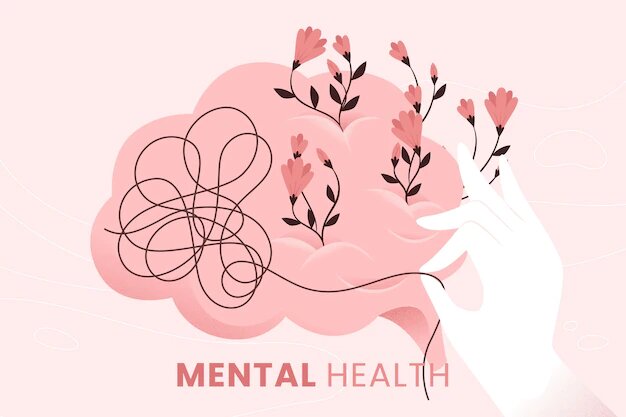
NO, I CAN’T STAND A DISTORTED LINE…I HAVE OCD.
DAMN! SHE IS NOT REPLYING TO MY TEXT…IT’S SO DEPRESSING.
THE RELATIVES ARE GOING TO BE HOME TONIGHT…AND IT’S GIVING ME ANXIETY.
One often thinks that having a mental illness or processing a trauma would make one special and different. Until it all becomes real.
The narratives sold through media tell us, it’s twisted hot to be “messes up” or sad. Social media also contributes to the romanticization of mental trauma. While social media provides a convenient venue for people to discuss these issues at their leisure, it also promotes a false image of mental health that makes it appear idealistic. It gets to the point where teenagers want mental diseases, which leads to their making false claims that they have them. Using mental trauma as an excuse for your everyday activities invalidates individuals who suffer from them.
Another myth about mental illness is that it makes you more creative. Although art can be therapeutic and there has historically been a link between creativity and mental illness—Vincent Van Gogh, for example, suffered from schizophrenia and bipolar disorder—it is not the cause of someone’s talent. After all, it’s difficult to be creative when getting out of bed is the most difficult thing to do. Romanticization causes a variety of issues. To begin with, it feeds into people’s misconceptions about mental health. We deny individuals the ability to see the truth of mental diseases by clinging to these representations. Second, people are encouraging others to self-harm as a result of the romanticization tendency. The encouragement of the use of alcohol, drugs, smoking, harmful coping mechanisms, and physical harming of oneself can all contribute to the influence of the glorification of mental trauma. Sensationalizing mental illness can be harmful, especially for impressionable young teenagers. Those images of self-harm could persuade others to see mental illness as “tragically beautiful”.
Additionally, Sensationalism can lead people to believe that mental illness is just a part of who they are, which might lead to the ignorance of therapy. The romanticism of mental trauma normalizes the viewpoint of an unhealthy mental state as something attractive, bitterly desirable, and painfully pleasurable. Instead of recognizing the disorder as a real issue that drastically affects people’s lives in many ways. It has been amplified by the media, which has led to misrepresentation of the whole issue.
The present culture of the glorification of the mental trauma is dangerous and damaging:
People with mental problems, on the other hand, find it more difficult to communicate. What if he assumes I’m self-harming because it’s fashionable? What if she dismisses the fact that I haven’t been out of bed in a week because I’m trying too hard? Being unable to have regular discussions due to anxiety is not a ‘cute’ experience, but rather an alienating one. Just because you can’t get your fingers around someone’s wrists doesn’t imply you don’t care about someone suffering from bulimia. It’s also not humorous to make a meme about death. As a result of not being taken seriously, people suffer in silence. Isn’t that what we were attempting to get away from?
Sadness isn’t beautiful. Trauma isn’t creative. No amount of Instagram quotes or Tumblr artsy photographs can change the truth that mental illness is not a desirable aesthetic. It is an event that makes people’s daily lives difficult. Tears, trauma, and treatment are all present. It’s weighty to the point where one can’t get out of bed. It’s losing one’s motivation, friends, and family, as well as sabotaging one’s education. It’s a daily battle that has claimed many lives, and it’s not pretty. In the end, suffering isn’t the same as being attractive. Pain is pain, and pain is pain.